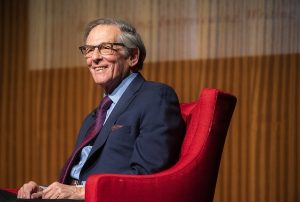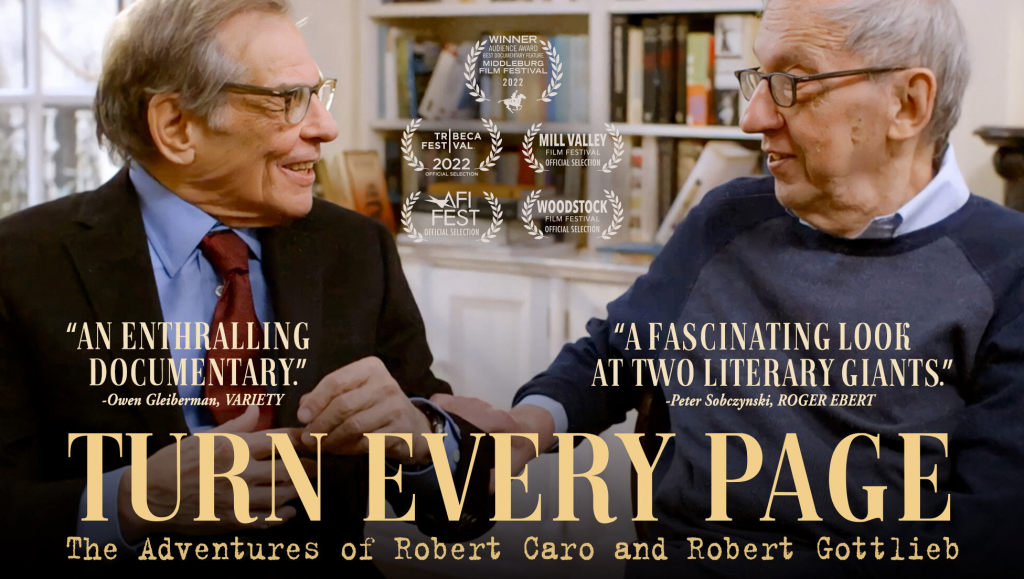The film title, “Turn Every Page,” is the vital maxim of the investigative journalist and historian.
At the beginning of COVID-19, in early 2020, I took the opportunity for some self-directed continuing education on writing and editing. I turned to Robert Caro’s Working, Researching, Interviewing, Writing (2019), written while working on volume 5 of President Lyndon B. Johnson’s massive biography. Volume 1 appeared in 1982. I also picked up Avid Reader, A Life (2016) by Robert Gottlieb, Caro’s editor. Coincidentally, four of Gottlieb’s chapters are titled “Working.” In addition, I read Draft No. 4, On the Writing Process (2017) by John McPhee. Caro, Gottlieb, and McPhee were born in 1935, 1931, and 1931 respectively; all had long histories with the New Yorker.
Gottlieb started in the publishing world at Simon & Schuster in 1955, went to Alfred A. Knopf in 1968, on to The New Yorker in 1987, and back to Knopf. He edited 600 to 700 of the English speaking world’s important books. As he said, the author “does the work. I do the cleanup. Then we fight.”
Gottlieb worked with Doris Lessing and Simon & Schuster when The Golden Notebook appeared in 1962. She followed him to Knopf and received the 2007 Nobel Prize for literature. He edited Toni Morrison’s Beloved (1987) and she received the Nobel Prize for Literature in 1993. Gottlieb’s stunning list of fiction and nonfiction writers includes Joseph Heller, Cynthia Ozick, Nora Ephron, Sidney Poitier, Bob Dylan, Barbara Tuchman, V. S. Naipaul and Salman Rushdie.
Gottlieb has edited Caro for over 50 years of often contentious work. Caro’s oeuvre started with The Power Broker, Robert Moses and the Fall of New York (1974), 1338 pages long, New York’s powerful urban planner. The largest issue was reducing over a million words to a readable and saleable size without losing the integrity of the story, plus quibbles about semi-colons and commas.

It generally takes Caro seven years to complete a book. Caro concentrated on the aggrandizement, use and abuse of power, by appointed NYC official Robert Moses and his ability to change the physical landscape and cityscape. The dislocation and human losses associated with Moses is presented in the fictional 2019 film “Motherless Brooklyn.” Three signed copies of The Power Broker are available on abebooks ranging from to $1000 to $2000.
Lyndon Johnson claimed a major part of Caro’s life. Initial estimates of length and time to deliver are part of mythmaking. Caro immersed himself in Texas Hill Country by living there to get a sense of place and personality. Johnson’s path traversing high school teacher, Congress, the Senate, and the presidency where he implemented the Great Society, had corrupt episodes. Caro credits Johnson with creating the opportunity for Barack Obama to run for president.
Gottlieb wrote biographies of Sarah Bernhardt, George Balanchine, and the children of Charles Dickens.
Lizzie Gottlieb, Gottlieb’s daughter, an award-winning documentarian, produced “Today’s Man” in 2006 about her brother, and “Romeo Romeo” in 2012 about a lesbian couple who wanted to have a child.
About 2017 she overcame her father’s and Caro’s resistance to her filming their intellectual and literary working relationship as writer and editor. True to Caro’s style, this 112 minute long film leaves the reader or viewer wanting more.
The stars of the documentary were Caro and Gottlieb with supporting roles from spouse and researcher partner Ina Caro and Maria Tucci. Barack Obama, who bestowed the National Humanities Medal in 2010 on Caro, stated he read The Power Broker in his early twenties. Bill Clinton, also edited by Gottlieb, Conan O’Brien, Ethan Hawke and Daniel Mendelsohn, among others, appear in cameos.
Filmed memories of their relationship include how ideas emerged and changed, reading, research, writing, encouraging and publishing house financial support, editing and publication. Both men recalled difficult relations with their fathers. Caro uses a faithful Smith Corona, wrote several drafts and took the carbon copy of the day’s work home. He owned as many as a dozen typewriters, many were gifts from admiring readers.
During COVID, Caro and Robert and Lizzie Gottlieb marketed their projects on Zoom and NPR. On December 12, 2022, at the New York Public Library, Caro and Gottlieb submitted themselves to public and Zoom examination accompanied by “Turn Every Page” film clips.
The movie is stunning, intimate, and a learning experience that warrants the highest accolades a documentary filmmaker can earn. Moreover, go see the movie. We had not been in a movie theater for three years. Any COVID concerns we had of mixing with lots of people were dispelled as the Christopher B. Smith Rafael Film Center in San Rafael “art-deco movie palace” seating an audience of 340 had only seven Sunday matinee viewers. For readers, writers, and those who prize literature, this is a reward, a treat, and the finest of continuing education.
Republished from San Diego Jewish World


























